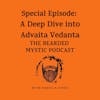Thoughts on The Bhagavad Gita (Chapter 5: Verse 11 - Verse 14)
In this episode, The Bearded Mystic Podcast discusses the 5th chapter of the Bhagavad Gita, specifically verses 11 - 14. Sri Krishna describes how this karma yogi sets the best example of how to be in the world and not of the world. They have completely identified as Formless Awareness, going beyond their past and future. Sri Krishna explains how the person established in this Formless Oneness, even though it appears that the senses are performing all actions sees inaction in action. Sri Krishna is reminding us that we are this Atman that is the witness consciousness within and that we can use the mind to control the mind and remind the mind itself to be free, unattached to the results of all actions. The atman is the non-doer; no god drives us to act nor controls the final outcome of any action. It is nature that takes care of all our actions and their outcomes.
Translation used: The Bhagavad Gita Comes Alive: A Radical Translation by Jeffrey Armstrong Available here on Amazon
I hope you enjoyed listening to the 40th episode of the Thoughts on The Bhagavad Gita and if you are interested in listening to more episodes like this on further chapters and verses, or on Non-Duality, or you want to learn more about the wisdom of the Mystics please follow/subscribe to this Podcast.
Listen to this episode ad-free and support The Bearded Mystic Podcast and get extra content on Apple Subscriptions and Patreon.
https://www.patreon.com/thebeardedmysticpodcast
If you would like a one on one meeting with me via Zoom, find the details here:
https://calendly.com/thebeardedmysticpodcast/1on1meetings
Please rate and write a review for this Podcast on https://www.thebeardedmysticpodcast.com/reviews/new/
If you would like to attend a free weekly meditation with me, join my Whatsapp group:
https://chat.whatsapp.com/DcdnuDMeRnW53E0seVp28b
Subscribe to the free monthly The Bearded Mystic Newsletter: http://thebeardedmysticpodcast.substack.com
You can find links to Live Streams, Podcast, Videos etc: https://linktr.ee/thebeardedmysticpodcast
You can follow me and contact me on social media:
Website: https://www.thebeardedmysticpodcast.com/
TikTok: https://vm.tiktok.com/ZMdk3HPJh/
Discord: https://discord.gg/4DbureZw8y
Instagram: https://www.instagram.com/thebeardedmysticpodcast/
Youtube: https://www.youtube.com/c/TheBeardedMysticPodcast/
Twitter: https://twitter.com/bearded_mystic
Facebook: https://www.facebook.com/The-Bearded-Mystic-Podcast
Can all the strange, weird, sometimes inexplicable happenings in our life be real? ...
Listen on: Apple Podcasts Spotify
Support the showHello, and welcome to another episode of The Bearded Mystic Podcast and I'm your host, Rahul N Singh. Thank you for taking out the time today to either watch or listen to this podcast episode. Today, we will be continuing on our thoughts on The Bhagavad Gita, but before we do begin, if you would like to support The Bearded Mystic Podcast, do sign up to the podcast's Patreon page. The details for that is in the show notes and video description below, you get ad free and bonus episodes and you can also get that by signing up to the Apple Subscriptions on the Apple Podcast App itself. Also every Saturday, there is a free meditation session
that we do at 11:00 AM Eastern standard time. If you would like to join, please do find the details in the show notes and video description below. In the last episode we discussed the fifth chapter of the Bhagavad Gita, which was specifically verses 7 to 10. Sri Krishna describes how this karma yogi sets the best example of how to be in the world and not of the world. They have completely identified as the Formless Awareness and therefore going beyond their past and their future. Sri Krishna explains how the person established in this Formless Awareness, even though it appears that the senses are performing all actions really, they see inaction in action. All that one needs to remember is that they are the observer and that no action belongs to the name and form. Sri Krishna declares that the yogi remains untouched by the outcomes of every action in the present and future, as they offer it all to Brahman, this Formless Awareness. Just like water does not cling to the Lotus leaf, when the Lotus is taken outta the water, we are not affected by the outcomes of any of our actions. So nice little imagery to use to help us. Today we'll be looking at chapter 5 verses 11 to verses 14. Now verse 11. Yogi's act through their body, indriyas, manas and buddhi, performing the necessary activities of life with no attachment to the outcome. They act merely to refine their atma. We will look at the whole verse. The yogis act through their body, that clearly shows that their body performs actions, their senses will also perform the necessary activities of life. So therefore seeing, perceiving, tasting , drinking, smelling. Those are necessary activities of life. For example, smelling is important in just in case there's a fire, you can smell that burning smell and therefore do something. So those are necessary activities in life, or when you taste food before you serve it to ensure that it tastes well, that there's enough salt or spices, things like that, that there's enough flavor in there. The senses are required. Or say the sense for seeing, it helps us to read or watch. Or hearing to listen to this podcast, things like that. So these are necessary activities of life and the senses perform that. The Manas, which is the mind and buddhi the intellect, They perform everyday activities, regardless of how spiritual one is, the intellect guides us with the understanding of what is real and unreal. Sat and Asat. What we know is Sat is changeless and Asat is that which continuously changes. All that is required is that there should be no attachment to the outcome. This is a message that is continuously occurring, and we know that the recurring of this theme of having no attachment to the outcome is important and that's why Sri Krishna keeps reemphasizing this. It's not because he wants to make it repetitive, what he's doing is, is making sure we really understand what he's asking for. You know, sometimes we can claim that we don't understand something, but when something is repeated a few times and we think about it, we contemplate on it. We focus upon it. It helps us see the bigger picture and therefore actually embeds that understanding more into our mind and our intellect, therefore making it more or less, easy to perform. The Yogi acts so they can keep refining their mind. Remember the Atman is already Pure. It's already this Formless Awareness. It's already Nirguna Brahman, but this, Jiva that needs to refine it's understanding to understand it's not the body and mind and it's the Atman. Now to do that it needs to utilize the mind. So it's the mind that has to keep refining the understanding that actually the mind is not in control and that we are not the mind, we are the Atman and it's the mind that helps us to refine that. Another way to do this is to keep offering all your actions to Brahman, whatever you do, offer it all to Brahman. Committing to this spiritual path, doesn't have to be lonely. As one is performing all the necessary activities of life. We can be completely spiritual and be the best in all of our relationships. It's absolutely fine. A necessary activity is going out with your friends, helping the community in any way you can serve. Doing all of those things are fine. Going to the pub and meeting your friends is absolutely fine. Spirituality does not have to be lonely. You can discuss about this Formless Awareness anywhere you like with the people that want to talk about it. And this is why as a podcast, we are trying to grow a community on Patreon and even now, we have started to do one on one meetings where I get to be a friend and we help each other to progress in spirituality. And this is important because when we do this, we see that spirituality is embedded in life. It's not two separate things. It's one and the same. And when we do that, then there's no duality in our mind. And when there's no duality, we are in the non-dual understanding of the Formless Awareness. The context of the whole verse is that Sri Krishna describes how this Karma Yogi shows how to perform daily activities and that they are just like us. Householders can perform actions without desiring any outcome or having any attachment to either pain or pleasure. Now, even as a householder, as kids, you know, probably our parents used to give us some pocket money, if we did some chores around the house, which is absolutely fine. You know, you expected a reward when you were a kid, that's fine, but now it's not that you should not expect a reward. So for example, If you perform a necessary activity, like going to work and performing all the tasks that you need to do at work. Yes the natural outcome is to get paid for that. That's the understanding, but that doesn't mean that you do work to seek that reward. You do your work activities for the activities itself rather than, oh, I'm gonna get paid that's why I'm doing it or that's the only reason why I'm doing it. There's always an added aspect to it. I hope that makes it a little bit clearer for us. Verse 12. A perfected yogi gives up attachment to the results of their actions and thereby becomes balanced and tranquil, while those who are still attached to enjoying the fruit of their actions remain in bondage to their desires. We're gonna look at the whole verse again. Now, first of all, Sri Krishna is saying that a perfected yogi is one who is completely immersed in the awareness of Brahman. Let's understand that as well. That perfected yogi is able to give up all attachment to the results of their actions. So what is the result of that detachment that we have, and that is being balanced and being tranquil. Now being balanced means we can make better decisions. We are more informed and we see the long term and short term implications of our actions. So we are able then to weigh our decisions on what action we want to do. We can weigh up our options when we make those choices. So that's why being balanced is more important and also it means that there's little personal bias in our actions too. Sometimes we may commit to an action or a decision, or we make a particular choice that may not be beneficial for people who are attached to you in a particular relationship, whether that's a spouse or you're a child and your parents expect you to do something or you as parents are expected to do something. Sometimes you make a choice which may not be beneficial for the child's happiness. Now let me give an example, when it comes to sweets, it may be fine to offer your child sweets and candy for a bit, but eventually you're gonna stop because it's gonna rot their teeth. So you then have to make an informed balance choice to say, I'm not going to give any more candy or sweets because it's going to cause more harm. That's a balanced approach. Yeah, it may be going against a child's happiness or a temporary happiness, but in the long run, the child's happiness of having good healthy teeth is considered. So we make better decisions when we are more balanced. We also commit to actions which will cause the least amount of harm. We've discussed this in previous episodes. And I reemphasize now that any action we do it with a balanced mind, is always one that will cause the least amount of harm to ourselves and to others, both in the long-term and short-term. And I want to make one thing very clear. The reason why I say long term first before short term is because a long term approach is better than short term. The reason for that is with a long term, you see with a lot more foresight and actually you exercise the muscle of foresight as well and then by thinking long term, you can then easily trace it back to short term. It's a much easier approach to do in my opinion. Therefore, if we cause the least amount of harm, we will naturally be tranquil meaning we are more at peace. Everyone seeks to have peace of mind or peace in their life. And this is one way of doing so when we are not attached to the outcome or to the results of our actions. If we are more peaceful and tranquil then that naturally strengthens our balance as well within the mind. So we will not be swayed by pleasure and pain when we are making those choices to act in a certain way. Now, however, those that are still attached to enjoying the fruits of their actions will remain in bondage to their desires is what Sri Krishna is saying. Even, I would say this is really understood if you are constantly chasing desires, right? And you want to continuously jump from one desire to another blindly without contemplating on what the outcome of that's going to be eventually. But I would even say that this is the reality of even noble beliefs, like the law of attraction or manifestation. Now it's all good. It may help someone kickstart their spiritual journey. And there's nothing wrong with that because one is asking the universe and one is seeing the universe as an infinite, creative principle, nothing wrong with that in the beginning. That's fine. But we will transcend that eventually because that's the beginning stage. Eventually we'll understand that when we ask for something from the universe, when we want something to be manifested, when we seek the law of attraction to get what we want, what we see is that it's keeping us bounded by desire, also very subtly. And therefore, the more we want to receive the pleasure of desire, we will keep being locked in by our desires itself. Even if we do actions with the expectation that it will give less pain, even then it is bounded by desire. So whatever we do , it will keep us bounded by desire. So the most important thing is to be beyond pleasure and pain. First of all, that's important. But the second thing is, yes, we may want to manifest what we want. We may want to, seek the law of attraction and utilize these beliefs to help us. But when we understand that oneness with the universe or oneness with the ground of being, the shared being is okay for the beginning, but eventually if we really want to be one, we have to go into awareness and remain there. And therefore, if we remain in awareness, we will not be looking for any particular result to any of the actions we do. We just commit to actions and that's it. We leave it there. Full stop at the end of it. There's no comma okay. There's no caveat, to add on there. The context of the whole verse is that Sri Krishna shows us what to expect in those that are detached from the outcome of their actions, which is balance and tranquility. And then what is the natural outcome of those that expect a result to an action is to remain in the grasp of our desires. Verse 13. By controlling the manas faculty and using it to release attachment to the results of all actions, the dehi or atma sits happily within the body as the ruler of the nava dvara pura ‘ city of nine gates’, neither acting nor controlling the outcome of action. Again, reemphasizing the message. And we're gonna break this up a little. The first part is by controlling the Manas faculty and using it to release attachment to the results of all actions. So by controlling the mind through observing the mind with the mind, we can bring it to a state of calmness. From that state, we use the mind to release us from the attachment to the results of all actions. So we constantly remind our mind that we are not attached to the outcomes or the results of any actions that we do. Remember that this is not for some actions, but all actions. It's not that this Karma Yoga only applies to some actions is for every action, all actions that we do. Then the second part is the dehi or atma sits happily within the body as the ruler of the nava dvara pur a the city of the nine gates, neither acting nor controlling the outcome of action. The Atman is sitting happily within our body, the Jiva is sitting happily there. There's no conflict there. There's no fight here. It's absolutely at peace with it. There's no problem with it because the Jiva is Brahman itself. This Brahman is Formless Awareness. Formless Awareness is continuously present, all we need to do is go back to it. Now the Atman is the ruler of the nine gates, which are two eyes, two ears, two nostrils, one mouth, one is a sexual gate and the other one is the wastegate and that makes the nine gates all together because these are called gates because all energy or sense information enters and leaves here. So that's why it's called, the city of nine gates. The Atman doesn't act at all and remains as a silent witness. Neither does the the Atman influence an outcome of an action. The witness has no purpose in doing so, so they don't control the outcome. They're not like, oh, well we want to seek pleasure. That's why we are going to do this. Or we are going to inflict pain. So, this is what we are going to do. That's not the way this Witness Consciousness does things. This is not the way the Formless Awareness does things. The Formless Awareness doesn't do anything. It just remains as a silent witness. It remains without acting. It remains completely free. And that's what we need to remember is our true self, is our true nature. So the context of the whole verse is that Sri Krishna is reminding us that we are this the Atman that is a witness Consciousness within, and that we can use this mind to control the mind and remind the mind itself to be free, unattached to the results of all actions. Then verse 14, the final verse for today's episode. That ruler of the city of the nine gates, through the Prabhu 'the master of the temporary body' does not determine the ultimate outcome of actions occurring in the world around them. Neither do they have the power to completely compel the behavior of other beings, nor do they have final control over outcomes that arise from complex actions in the world. All final outcomes are governed by the laws of material nature. We are gonna break up the verse, the first part of the verse is. That ruler of the city of nine gates through the Prabhu 'the master of the temporary body does not determine the ultimate outcome of actions occurring in the world around them. So remember the dehi or the Atman is the ruler of the nine gates from the previous verse. Now this is the master of the temporary body. What we have is a temporary body. Remember in previous chapters, we've understood that when our body dies, it's merely like changing our clothes that get worn out. Remember that this body is temporary. Why? Because it's changing, \, it's going from being born to a toddler, to teenage, to middle age, to old age basically is going through all these changes, is constantly changing, therefore it's unreal, The master is that, which is permanent, which is changeless, which is this Witness Consciousness or this Atman or this Formless Awareness. However, despite being the master, it does not determine the outcome of any action. It's a master that does not rule like a dictator. It's more of a passive master, more of a humble master. And that's a really cool way of understanding what the atman is. It doesn't matter what action is done in the world around them, the Atman is not responsible for this. The reason for this line is possibly because we may wonder that if the Atman is the ruler in me, then it must be for others as well. Therefore it's not responsible for the action of others. If it's not responsible for the actions you do, because it's the silent Formless Awareness, then it's not gonna be responsible for any of the actions of others. However we know that the atman neither controls the ultimate outcome for our actions or the action of others. The next part of the verse. Neither do they have the power to completely compel the behavior of other beings, nor do they have the final control over outcomes that arise from complex actions in the world. So let's explain this. So neither does the Atman have the power to completely drive the behavior of other beings. It doesn't have any influence there. So as the saksi, it is the non doer. As the witness, it is the non doer. As the observer, it's the non doer. No action happens in the Atman. It doesn't recognize action because it's an observer. It's a witness. The Yogi doesn't force others to perform any actions either. Nor does the Yogi the Atman have the final control over the outcomes that arise from complex actions in the world. The Atman being the non doer, how can it have any final control and also with the complex actions of the world, the Atman will always be separated from that because it's the mind that will make the choice. It's the buddhi that will make the choices of our actions and therefore, any complex actions that are done due to the buddhi, due to the clarity of the buddhi the Atman will still have no control over the outcomes there because the outcome will only be received to the temporary body. Nor should we believe that it is some God that is doing this. Remember that no God is performing any action of ours. The body performs the actions, the mind, creates the thoughts and the intentions behind the actions of the body too. It's not some God that is controlling this. The question maybe is how is all this being controlled and driven then if it's not some God and if we, as the witness Consciousness is not doing it? Sri Krishna answers this with the last part of the verse, which is all final outcomes are governed by the laws of material nature. Very important to understand this. Everything is governed by nature. Nature has its own laws. Nature has its own rules. Therefore, if we comply with nature, it's all good. If we don't, we are gonna face conflict there. So it is nature that takes care of the outcomes and reactions to all the actions that is performed by this temporary body. It is nature that drives the temporary body to act. It is nature that we either enjoy or dislike the fruits of our actions. Remember clearly that the only time we think the Atman acts is when we are in ignorance and associate the Atman with nature, which is not the right understanding. The correct understanding is that the Atman is not nature and therefore has no part or play in nature. This then will bring us closer to the understanding that the eternal witness, the Formless Awareness within is the Atman. The context of the whole verse is the Atman is the non doer and there is no God that is driving us to act or controls the final outcome of any action. It is nature that takes care of all of our actions and their outcome. And that's why Sri Krishna in the previous verses talked about respecting the devas, the elements of nature, because that is what provides us with things in life. The other thing to understand is that no God is telling us what to do and no God is dictating that this is going to happen if you do this. The world is complex. Our actions are complex. The simple way to be is to allow complex actions to occur, but remain as the saksi, the witness, the observer, as the Formless Awareness as Nirguna Brahman. So that's how we can commit to a life of spirituality. This is the end of the episode. Please do share this podcast with your friends and family who may enjoy this content. Do follow me on social media to keep getting updates, subscribe to the Monthly The Bearded Mystic newsletter, or join the Bearded Mystic Podcast Discord Server, all the details for those are in the show notes and video description below. If you would like to support the Bearded Mystic Podcast, you can check out the podcast Patreon page or support the podcast through Apple Podcast subscriptions. And you can find that on the apple podcast app itself. The details for the Patreon page are in the show notes and video description below. Please do rate and review the podcast on our website, www.thebeardedmysticpodcast.com. Please do like, and comment on this video if you're watching this on YouTube and do subscribe to the YouTube channel. Thank you very much for listening and we'll end with the Shanti mantra. Aum Shanti Shanti Shanti. Aum Peace Peace Peace. Namaste.
New to The Bearded Mystic Podcast?
Here are some great episodes to start with. Or, check out episodes by topic.















